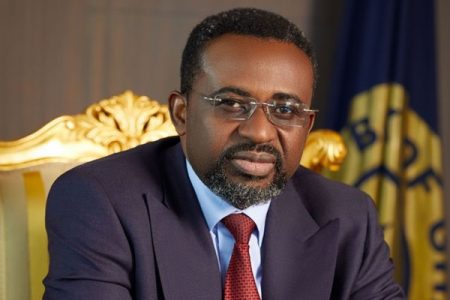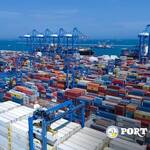At a time when global trade dynamics are being redefined, the Governor of the Bank of Ghana, Dr. Johnson Pandit Asiama, has issued a compelling call for a new foundation for U.S.–Africa engagement.
Speaking at a high-level forum on Africa’s trade future, Dr. Asiama proposed a bold four-pillar strategy to reimagine the continent’s partnership with the United States—urging both sides to move from narrow deals to shared direction, from extractive exchanges to value-added collaboration, and from fragmented transactions to long-term frameworks for sustainable growth.
Trade surplus masks fragile realities
In 2024, total goods trade between Africa and the United States reached $71.6 billion, with Africa recording a rare surplus of $7.4 billion. Yet, beneath these figures lies a troubling reality.
Africa’s trade with the U.S. remains concentrated and vulnerable. Nigeria’s $2.2 billion in exports were dominated by crude oil, which accounted for 65 percent of the total, underscoring the urgent need for diversification.
South Africa, often cited as a model of export diversification, nonetheless ended the year with a daunting $8.8 billion trade deficit.
Meanwhile, Lesotho’s garment industry is bracing for a 50 percent tariff shock, and Côte d’Ivoire’s cocoa sector continues to grapple with volatile global trade terms.
Macroeconomic credibility and strategic autonomy
Dr. Asiama began with the first pillar: macroeconomic credibility and strategic autonomy.
He argued that without macroeconomic stability, no investment climate can be truly sustainable.
Across the continent, inflation is being reduced, reserves are being built, and governments are implementing fiscal consolidation measures.
Central banks have taken bold steps to strengthen transparency, operational independence, and policy credibility.
Yet, stability is only the beginning. The Governor emphasized that Africa must also claim strategic autonomy by redefining its place in global trade—not as a passive supplier of raw materials, but as an active partner in global production and value chains.
Financial resilience and risk mitigation
The second pillar centered on building resilient financial systems that can withstand shocks and channel capital into productive sectors.
Dr. Asiama pointed to Ghana’s Financial Stability Fund, created in partnership with international allies, as a model for post-pandemic recovery.
However, he urged African nations to go further. By embedding technology in financial oversight—through SupTech and RegTech—and enhancing institutional accountability, Africa can build a financial ecosystem that turns investor interest into real economic impact.
Deepening trade integration, unlocking investment
Trade integration and access to finance, the third pillar, remain critical barriers to Africa’s export potential.
As global supply chains evolve, Africa must shift from being a resource base to a thriving industrial hub.
Dr. Asiama highlighted Ghana’s efforts in this direction, with active investment across agro-processing, energy infrastructure, logistics, and manufacturing.
From cocoa and rice processing to off-grid energy solutions and 24-hour productivity zones, Ghana is laying the groundwork for industrial growth. But these sectors will not scale without tailored financing.
Dr. Asiama reiterated the call for U.S.–Africa Trade Finance Hubs, backed by EXIM Bank and Afreximbank, to de-risk investment and provide blended finance for SMEs and high-growth industries.
Inclusive digital transformation
The final pillar, inclusive digital transformation, is vital for empowering Africa’s large and youthful population.
The Governor emphasized that digital access alone is not enough—digital inclusion must be deliberate.
Ghana’s eCedi pilot represents a bold step toward inclusive financial systems that protect monetary sovereignty and expand access.
He welcomed the U.S. government’s $350 million Digital Transformation with Africa initiative but called for deeper alignment with national strategies, including support for cybersecurity frameworks and interoperable payment systems. “This is not just a tech agenda,” he stressed. “It is a development imperative.”
AGOA at a crossroads
Looking ahead to the expiration of AGOA in 2025, Dr. Asiama insisted that the trade pact must be renewed—but reformed.
The new AGOA should reflect Africa’s ambitions to move beyond raw commodity exports. It should promote value addition, encourage joint ventures, and reduce compliance burdens for smaller exporters.
Furthermore, it must expand into fast-growing sectors like digital trade and e-commerce, where African entrepreneurship is thriving.
Ghana-U.S. trade success stories
Dr. Asiama illustrated what successful trade partnership looks like through examples from Ghana. Kosmos Energy, based in Texas, discovered the Jubilee oil field, launching Ghana into the league of oil-producing nations.
Newmont Mining, America’s largest gold investor in Ghana, has created thousands of jobs and deepened local supply chains.
And Niche Cocoa, a Ghanaian firm, has opened a processing facility in Wisconsin—moving up the value chain and creating transatlantic jobs.
In 2024, Ghana exported $1.6 billion in crude oil, cocoa, and timber to the U.S., and imported $874 million, creating a surplus of $730 million.
But more than trade balances, it is the transformative stories that matter.
From transactional to transformational
In closing, Dr. Asiama reminded the audience that the Forum was only the beginning. “Africa’s voice must be confident, coordinated, and catalytic,” he said.
“The real work lies ahead—in the institutions we strengthen, the partnerships we deepen, and the future we shape together.”
His message was unequivocal: it is time to shift from transactional trade to transformational collaboration.
With the right vision, the right policies, and the right partners, Africa and the U.S. can co-create a new era of shared prosperity.
- African Central Bankers demand fair global debt support - 23 April 2025
- World Bank to help Ghana provide jobs - 23 April 2025
- Tamale doctors threaten industrial action over minister’s confrontation - 23 April 2025

